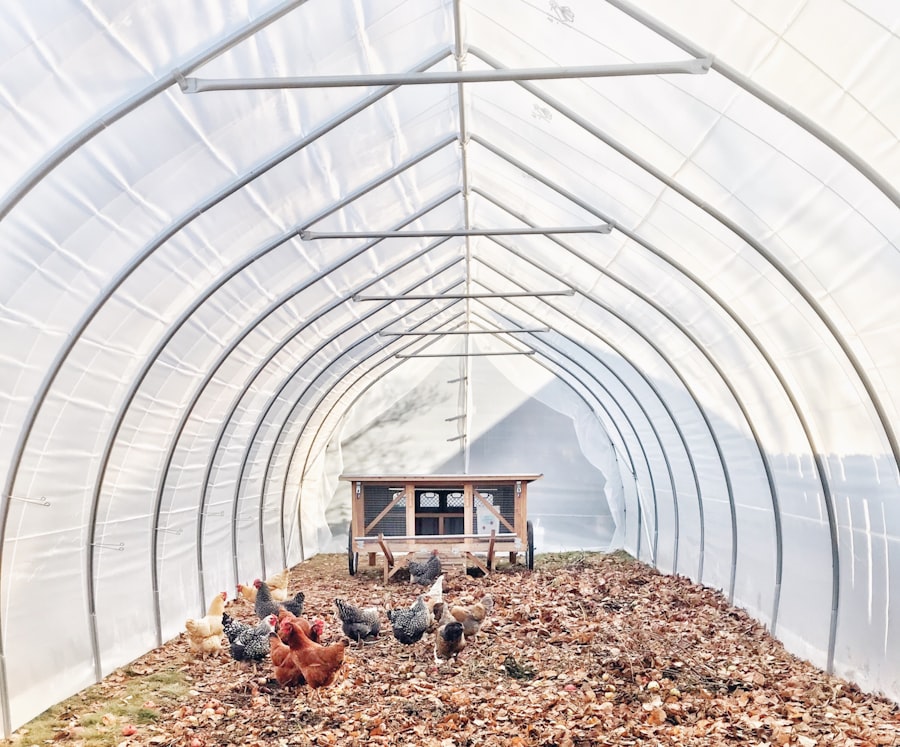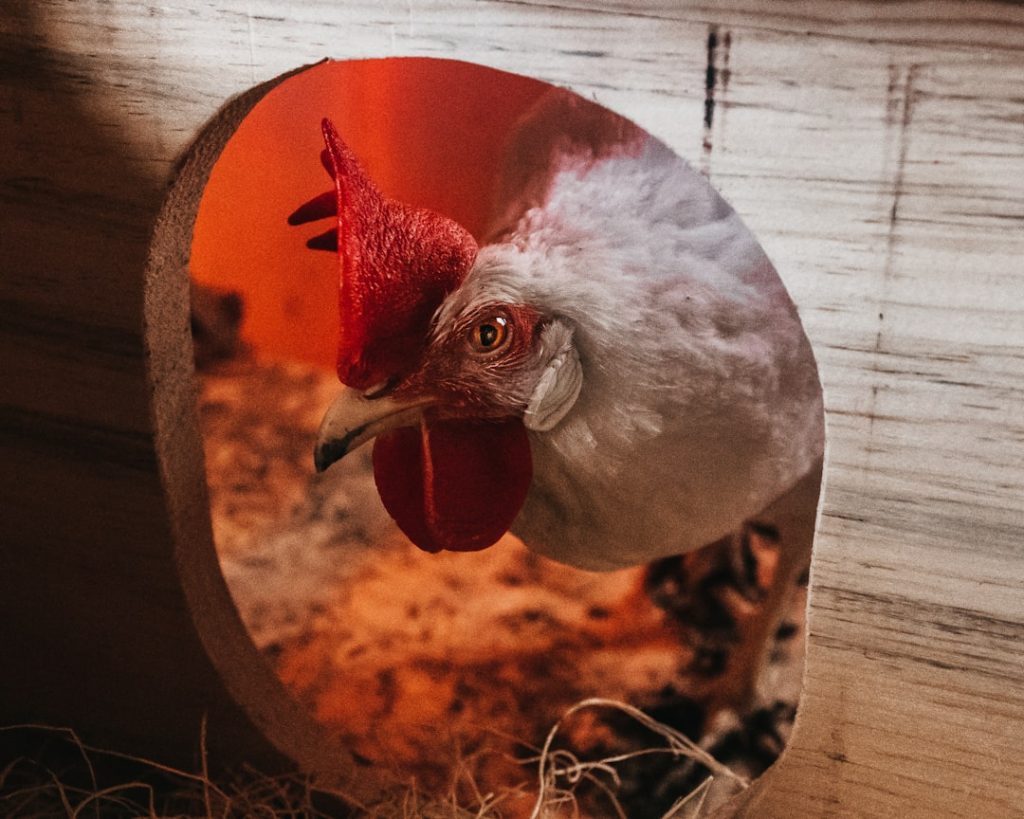Gnats are small flying insects that can significantly impact the health and welfare of chickens. These insects are drawn to moist environments and organic materials, making chicken coops and their surroundings ideal breeding sites. Gnat infestations in chicken coops can lead to various issues for the birds.
The insects irritate and bite chickens, causing discomfort and stress. In extreme cases, gnat bites may result in open wounds and infections, potentially harming the chickens’ health. Gnats can also act as vectors for diseases and parasites, further compromising the birds’ well-being.
Chicken owners must recognize the risks associated with gnats and implement preventive measures to control infestations. The impact of gnats extends beyond mere annoyance, affecting egg production and overall flock health. Constant harassment by gnats can stress and agitate chickens, potentially reducing egg output.
Chickens may scratch and peck at their skin in response to gnat bites, leading to self-inflicted injuries and possible infections. Severe gnat infestations can even cause anemia in chickens due to blood loss from repeated biting. It is crucial for chicken keepers to understand these potential consequences and take appropriate action to safeguard their flocks from gnat infestations.
Table of Contents
- 1 Creating a gnat-free environment for your chickens
- 2 Implementing natural remedies to repel gnats
- 3 Using commercial products to deter gnats from chickens
- 4 Maintaining cleanliness and hygiene in the chicken coop
- 5 Monitoring and controlling gnat populations in the surrounding area
- 6 Seeking professional help for severe gnat infestations
- 7 FAQs
Key Takeaways
- Gnats can pose a threat to chickens by causing irritation, transmitting diseases, and reducing egg production.
- Creating a gnat-free environment for chickens involves eliminating standing water, keeping the coop clean, and using screens on windows and doors.
- Natural remedies such as planting gnat-repelling herbs and using essential oils can help deter gnats from bothering chickens.
- Commercial products like gnat traps and insecticides can be used to keep gnats away from chickens, but care should be taken to avoid harming the birds.
- Maintaining cleanliness and hygiene in the chicken coop is essential for preventing gnat infestations and keeping chickens healthy.
- Monitoring and controlling gnat populations in the surrounding area through proper waste management and landscaping can help reduce the risk of infestations.
- Severe gnat infestations may require professional help from pest control experts to effectively eliminate the problem and protect the chickens.
Creating a gnat-free environment for your chickens
Proper Ventilation is Key
One of the first steps in achieving this is to ensure proper ventilation in the chicken coop. Good airflow can help reduce moisture levels, which in turn can deter gnats from breeding in the coop.
Keep the Coop Clean and Dry
Additionally, keeping the coop clean and dry is crucial in preventing gnat infestations. Regularly removing soiled bedding, droppings, and spilled feed can help eliminate potential breeding grounds for gnats. Using absorbent bedding materials such as straw or wood shavings can also help maintain a dry environment in the coop.
Eliminate Standing Water and Maintain the Outdoor Area
Another important aspect of creating a gnat-free environment for chickens is to minimize standing water around the coop. Gnats are attracted to moisture, so it is essential to eliminate any sources of stagnant water where gnats can breed. This includes fixing leaky faucets, draining puddles, and regularly emptying and cleaning water containers. Maintaining a well-kept outdoor area around the coop can help reduce gnat populations. Keeping grass and vegetation trimmed and removing any decaying organic matter can help deter gnats from congregating near the coop.
Implementing natural remedies to repel gnats

Implementing natural remedies to repel gnats can be an effective way to protect chickens from these pesky insects. One natural remedy is to use essential oils with gnat-repelling properties. Essential oils such as citronella, eucalyptus, lavender, and peppermint can be diluted with water and sprayed around the chicken coop to deter gnats.
These oils not only repel gnats but also have the added benefit of providing a pleasant scent in the coop. Another natural remedy to repel gnats is the use of herbs with insect-repelling properties. Planting herbs such as basil, mint, rosemary, and lemongrass around the coop can help deter gnats from the area.
These herbs not only act as natural insect repellents but also provide additional benefits such as culinary use and aromatic qualities. Additionally, introducing insect-eating plants such as pitcher plants or sundews near the coop can help reduce gnat populations naturally.
Using commercial products to deter gnats from chickens
In addition to natural remedies, there are also commercial products available that can help deter gnats from chickens. One option is to use gnat traps specifically designed for outdoor use. These traps typically use UV light or pheromones to attract gnats and then trap them using adhesive surfaces or electric grids.
Placing these traps around the chicken coop can help reduce gnat populations in the surrounding area. Another commercial product that can be used to deter gnats from chickens is insecticide sprays specifically formulated for outdoor use. These sprays typically contain ingredients such as pyrethrin or permethrin, which are effective in killing and repelling gnats.
It is important to carefully follow the instructions on these products and ensure that they are safe for use around chickens. Additionally, it is crucial to avoid spraying these products directly on the birds or their feed and water sources.
Maintaining cleanliness and hygiene in the chicken coop
Maintaining cleanliness and hygiene in the chicken coop is crucial in preventing gnat infestations. Regularly cleaning the coop by removing soiled bedding, droppings, and spilled feed can help eliminate potential breeding grounds for gnats. It is also important to regularly inspect and clean water containers to prevent the buildup of algae and other organic matter that can attract gnats.
In addition to regular cleaning, it is essential to practice good waste management in the coop. Properly disposing of organic waste such as spoiled feed, fruit scraps, and vegetable peels can help reduce gnat populations in the area. Using sealed containers for storing feed and composting organic waste away from the coop can also help minimize gnat attractants.
Monitoring and controlling gnat populations in the surrounding area

Monitoring Gnat Populations
One effective way to monitor gnat populations is by using sticky traps placed around the coop and outdoor area. These traps can help gauge the level of gnat activity and indicate if there is a potential infestation brewing.
Environmental Modifications
Controlling gnat populations in the surrounding area can be achieved by implementing environmental modifications. This includes reducing sources of standing water, trimming vegetation, and eliminating decaying organic matter that can attract gnats.
Natural Predators
Additionally, introducing natural predators of gnats such as dragonflies or predatory insects can help keep gnat populations in check.
Seeking professional help for severe gnat infestations
In severe cases of gnat infestations, it may be necessary to seek professional help to effectively control the problem. Pest control professionals have the expertise and resources to assess the extent of the infestation and implement targeted control measures. They may use specialized equipment and insecticides that are not readily available to consumers to effectively eliminate gnat populations.
In some cases, it may be necessary to consult with a veterinarian if gnat bites have caused health issues in chickens. Veterinarians can provide medical treatment for gnat bites and infections and offer advice on how to prevent future infestations. In conclusion, understanding the threat of gnats to chickens is crucial for maintaining a healthy flock.
By creating a gnat-free environment, implementing natural remedies, using commercial products, maintaining cleanliness and hygiene, monitoring and controlling gnat populations, and seeking professional help when necessary, chicken owners can effectively prevent and manage gnat infestations in their coop and surrounding areas. By taking proactive measures, chicken owners can ensure the well-being of their flock and minimize the impact of gnats on their chickens’ health and productivity.
If you’re looking for more information on keeping your chickens healthy and happy, you might be interested in learning about what you should feed ducks. Ducks have different dietary needs than chickens, and it’s important to provide them with the right nutrition to keep them thriving. Check out this article on what you should feed ducks to ensure you’re meeting all of your feathered friends’ dietary needs.
FAQs
What are gnats and why are they a problem for chickens?
Gnats are small, flying insects that can be a nuisance to chickens. They can irritate the birds, cause stress, and potentially transmit diseases.
How can I keep gnats off my chickens?
There are several methods to keep gnats away from your chickens, including using natural repellents like essential oils, keeping the coop clean and dry, and using fly traps or sticky tape.
Are there any natural remedies to keep gnats away from chickens?
Yes, natural remedies such as planting herbs like lavender and mint around the coop, using essential oils like citronella or eucalyptus, and using apple cider vinegar in the chickens’ water can help repel gnats.
Can gnats transmit diseases to chickens?
Yes, gnats can potentially transmit diseases to chickens, so it’s important to take measures to keep them away from your flock.
What are some signs that my chickens are being bothered by gnats?
Signs that your chickens are being bothered by gnats include excessive scratching, restlessness, and irritation. It’s important to address the issue promptly to keep your chickens healthy and comfortable.
Meet Walter, the feathered-friend fanatic of Florida! Nestled in the sunshine state, Walter struts through life with his feathered companions, clucking his way to happiness. With a coop that’s fancier than a five-star hotel, he’s the Don Juan of the chicken world. When he’s not teaching his hens to do the cha-cha, you’ll find him in a heated debate with his prized rooster, Sir Clucks-a-Lot. Walter’s poultry passion is no yolk; he’s the sunny-side-up guy you never knew you needed in your flock of friends!







